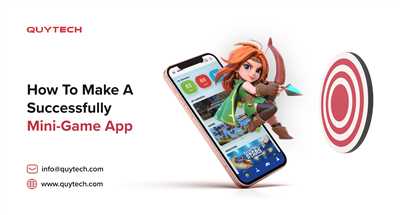
Creating a mobile game can be an exciting and rewarding experience. With the wide range of tools and options available, developers can construct a game that offers a unique and engaging experience for users. In this article, we will explore how to develop a mobile game from start to finish and address some of the most important aspects of game development.
Before diving into the technical details, it is important to think about the different types of games and the focus of your project. There are many genres and mechanics to choose from, so it’s vital to have a clear idea of what you want to create. Whether you are making a free-to-play game or a paid one, having a plan for monetization is also important. This section will help you narrow down your options and make informed decisions about the direction of your game.
Once you have a clear vision for your game, it is time to start building. There are many tools available for mobile game development, from coding options to no-code solutions. Google offers a wide range of tools and resources to help with mobile game development, including the Android gaming development pipeline. These tools can be used to optimize performance, collaborate with other developers, and integrate analytics into your game. Additionally, there are many third-party tools available that can assist with specific aspects of game development, such as graphics, sound, or animation.
As you start developing your game, it is important to keep in mind the lifecycle of a mobile game. Retention and user acquisition are key factors in the success of a game, so it’s important to focus on creating a game that will keep users engaged and coming back for more. This can be done through creative gameplay, regular updates, and a strong community presence. Additionally, integrating social features and offering rewards can help increase user engagement and retention.
Before releasing your game, it’s important to test and optimize it for different devices and screen sizes. This can be done through profiling and performance testing, as well as taking into account the technical limitations of certain devices. By doing this, you can ensure that your game is accessible and enjoyable for the widest possible audience.
In conclusion, creating a mobile game requires careful planning, technical knowledge, and creativity. By using the tools and resources available, developers can build a game that stands out from the crowd. Whether you are a seasoned developer or just starting out, the information and tips provided in this article will help you develop and launch a successful mobile game.
FAQs about how to create a mobile game
Below is a list of frequently asked questions about how to create a mobile game:
| Question | Answer |
| What is mobile gaming? | Mobile gaming refers to the playing of video games on mobile devices, such as smartphones and tablets. |
| What is the lifecycle of a mobile game project? | The lifecycle of a mobile game project typically involves stages such as planning, designing, developing, testing, publishing, and updating. |
| How can I collaborate with others on a mobile game project? | You can collaborate with others on a mobile game project by using collaboration tools, such as project management software or version control systems. |
| What kind of support is available for mobile game development? | There are various resources available for mobile game development, including online forums, documentation, tutorials, and communities of developers. |
| Do I need coding skills to create a mobile game? | Yes, having coding skills is important for creating a mobile game, as it involves programming and implementing game mechanics. |
| Is there a cost associated with making a mobile game? | There can be costs involved in making a mobile game, such as licensing fees for development tools, marketing expenses, and hiring developers or artists. |
| Is it possible to develop a mobile game for multiple devices? | Yes, using cross-platform development tools, it is possible to develop a mobile game that can run on multiple devices and platforms. |
| What offers relevant tools for building a mobile game? | There are many tools available for building a mobile game, including game engines like Unity and Unreal Engine, as well as software development kits (SDKs) for specific platforms like Android or iOS. |
| Can I create a mobile game without coding? | Yes, there are no-code or low-code solutions available that allow you to create a mobile game without coding, using visual scripting or drag-and-drop interfaces. |
| What are some frequently used analytics tools in mobile game development? | Some frequently used analytics tools in mobile game development include Google Analytics, Firebase Analytics, and Unity Analytics, which help track player behavior and optimize game performance. |
| How can monetization be done using a mobile game? | Monetization in mobile games can be done through various options, such as in-app purchases, advertising, sponsorships, or offering premium content or features. |
| Which mobile platforms are commonly targeted when making a mobile game? | The most common mobile platforms targeted when making a mobile game are Android and iOS, as they have the largest user bases and app stores. |
| What is a one-time solution for making a mobile game? | There is no one-time solution for making a mobile game, as it requires continuous updates, bug fixes, and support to keep the game relevant and functioning well. |
| What are some important considerations before making a mobile game? | Some important considerations before making a mobile game include defining the target audience, understanding the market and competition, and planning for the long-term maintenance and updates of the game. |
| What tools can help optimize the performance of a mobile game? | Tools like profiling and performance analytics can help identify and optimize performance issues in a mobile game, ensuring smooth gameplay experience on a wide range of devices. |
| What is free-to-play in mobile games? | Free-to-play refers to a pricing model where the game is available for free to download and play, but offers in-app purchases or ads to generate revenue. |
| Are there other options for monetization in mobile games? | Yes, besides in-app purchases and ads, other options for monetization in mobile games include subscriptions, loot boxes, and merchandise sales. |
| What are some common problems faced while developing a mobile game? | Some common problems faced while developing a mobile game include technical issues, compatibility problems on different devices, performance optimization, and meeting deadlines. |
| How can mobile game analytics help? | Mobile game analytics can help track player behavior, measure the success of game mechanics, identify areas for improvement, and make data-driven decisions for game updates and optimization. |
These FAQs provide some answers to common questions about creating a mobile game. However, there are many more aspects to consider, and the process of making a mobile game can vary depending on the specific project and goals.
Build your mobile game

If you’re interested in developing a mobile game, there are a wide variety of options available to you. Depending on your technical skills and the type of game you want to create, there are different approaches you can take to build your game.
One of the most popular platforms for mobile game development is Android. Google offers a wide range of tools and resources to support developers in creating games for their platform. If you’re new to game development, you can start by using no-code or low-code solutions that allow you to create games without any coding. These solutions often provide a drag-and-drop interface and pre-built mechanics that you can easily customize.
If you’re more experienced and prefer to dive into coding and have more control over your game, there are many game engines available that you can use. Some of the most commonly used engines for mobile game development include Unity and Unreal Engine. These engines provide a wide range of features and support for building high-performance games.
Before you start building your game, it’s important to think about the gameplay mechanics and the target audience of your game. This will help you make design decisions that are relevant to your users and increase the chances of your game being successful.
Building a mobile game involves a wide range of tasks, from creating the game assets to optimizing the performance for different devices. It’s a complex process that requires technical skills and creativity. However, there are many resources available to help you along the way. The game development community is a great place to collaborate and learn from others who are also building games. Additionally, there are online tutorials, forums, and documentation that can guide you through the different stages of development.
When building a mobile game, it’s important to consider the monetization model. Free-to-play games with in-app purchases are a popular choice among developers. This model allows users to download and play the game for free, but offers optional purchases within the game to enhance the gameplay or unlock additional content.
Another important aspect of game development is the lifecycle management. It’s important to constantly update and improve your game in order to retain and engage your users. Analytics and profiling tools can help you gather data about your players’ behavior and make informed decisions about updates and optimizations.
Building a mobile game can be a challenging task, but with the right tools and resources, it’s also a rewarding one. As soon as you start building your game, you’ll encounter problems and challenges, but don’t worry, there are solutions available to help you overcome them. The key is to stay focused, be creative, and collaborate with the game development community. Soon enough, you’ll have your own mobile game available for users to play and enjoy.
The Mobile Game Monetization
Monetization is a crucial aspect of mobile game development as it determines the potential financial success of a game project. In order to make money from a mobile game, developers must consider various actions and strategies to optimize the game’s revenue generation.
One of the most important tools used in mobile game monetization is analytics. By integrating analytics engines into the game’s development pipeline, developers can collect valuable data about user behavior, in-app purchases, and ad impressions. This data can then be used to make informed decisions about monetization strategies and in-game mechanics.
Free-to-Play Model

Many mobile games opt for the free-to-play model, where the game itself is available to play without any cost. However, in-app purchases and advertisements are used to generate revenue. This model helps increase the game’s reach and allows players to enjoy the game without upfront payment.
Creating a mobile game without any technical knowledge is now possible with the advent of no-code tools. These tools offer a wide range of options for building and developing games, without the need for coding skills. This opens up game development to a larger community and allows for more creative possibilities.
Retention and Player Engagement
In order to monetize a mobile game effectively, it’s essential to focus on player retention and engagement. Retention refers to the ability to keep players coming back to the game over a prolonged period of time. By offering relevant and engaging content, developers can increase user retention and, consequently, revenue.
Player engagement can be enhanced by implementing social features, such as leaderboards, achievement systems, and multiplayer options. These features encourage competition and collaboration among players, increasing their investment in the game.
Another important factor in mobile game monetization is the performance of the game on different devices. It’s crucial to test and optimize the game for various devices and operating systems, such as Android and iOS. This ensures a smooth user experience and avoids potential problems that can lead to poor user reviews and fewer downloads.
Support and Community
Providing support for players is important for user satisfaction and retention. Frequently Asked Questions (FAQs) and community forums can help players find answers to their queries and connect with other users. Building a strong community around the game can help increase its popularity and ensure ongoing support.
Collaboration with other developers and accessing professional support is also beneficial for mobile game monetization. Many developers offer cloud-based services and platforms that allow for easy collaboration, code sharing, and debugging. Additionally, accessing the expertise of professionals in areas such as game design and monetization strategies can greatly enhance the success of a mobile game.

